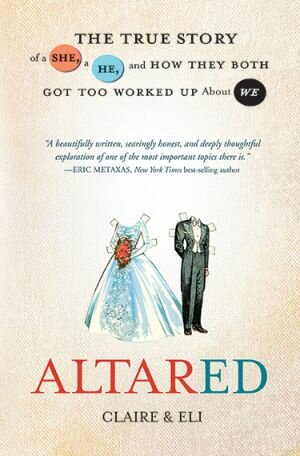An alternate perspective of love
Review
Former couple offers critique of the modern church's emphasis on marriage

Claire and Eli did not meet with the intention of co-authoring a book about love. They met because they thought they might have been in love.
In Altared: The True Story of a She, a He, and How They Both Got Too Worked Up About We, the authors recount their first meeting, their long-distance relationship and their eventual break-up. The narrative passes seamlessly between the two, but interspersed within the account lies an analysis and critique of the modern church's emphasis on marriage.
Drawing heavily upon Scripture and the words of theologians, including John Calvin, Dietrich Bonhoeffer and Søren Kierkegaard, the authors investigate what it means to truly love one's neighbor. Rather than focusing attention on finding a suitable spouse, the authors believe that Christians must first learn to love those around them - even those who may not be considered "marriage material."
The authors use pseudonyms, but they at least tell readers that Eli is a graduate of the University of Chicago Law School and Claire is a writer and editor living in New York City. In the following interview, Claire shared some insights on the inspiration for and process of writing Altared.
Note: The following interview has been edited for length and clarity.
One would think the last thing you'd want to do after breaking up with someone would be to start writing a book together. What inspired you to agree to the project?
Yes, writing a book about love with your ex-boyfriend is definitely a little crazy. The project came out of a conversation Eli and I had over dinner one night after we had already broken up. We were both at a place where the question Eli was asking-What if we are too worked up about marriage?-hit us both in a major way. One thing led to the next and before we knew it, we were putting our ideas down in words and then those words somehow became a book.
The book opens with a description of piles of marriage books that filtered through Eli's house. How does "Altared" stand out amidst all the other works on Christian marriage?
The hope is that Altared reframes the discussions around both singleness and marriage by stepping back and putting them into the larger context of discipleship and Christian love.
You say Altared isn't another book about marriage--it's about love. Are you contesting the idea that marriage is the strongest expression of love?
In a way, yes we are. We don't have anything against marriage, and marriage is certainly a beautiful conduit for love. But the fact is, much of our current understanding of marriage has more to do with a modern romantic ideal than it does with Christ. "Christian" expressions of love often look a lot more like the characters in the latest romantic comedy, than the Savior whose name we bear. And our concern isn't so much to disagree with where Christian love is shown-in marriage or elsewhere-but to improve our understanding of what that love actually is. And at a minimum, it's quite different from the modern vision of romance that we hold now.
What do you hope that couples would gain from reading "Altared," or is it specifically geared toward single readers?
No, we absolutely hope both couples and singles read the book, and we hope they'll be inspired towards a love that transcends cultural romance. That they will come to love God and understand discipleship, and that love will become their aim both in romance and outside of romance. We hope to take the emphasis off status altogether and place more of our aim on Christ's definition of love, which means loving your neighbors with a very counter-cultural love.
Would you say the Church's exalted view of marriage is due to a misreading of Scripture or an overly selective reading?
I'm sure it has a little to do with both of these causes and several other factors as well. One thing we hope this book does is balance out some of the selective reading-which is often not intentional or malicious at all-and remind Christians of some passages and teachings that it seems we don't give much thought to, such as 1 Corinthians 7, or Christ's call to the love those on the margins. The Bible in general seems far less interested in romance than in loving one's neighbor.
What advice would you give to those who are struggling with being more interested in their love lives than loving their neighbors?
I would encourage them to pray about it, to pray patiently and faithfully about it in solitude and in community. I would encourage them to find good examples, people they can learn from. I would pore over the gospels, 1 Corinthians 13, Colossians 3. I would encourage them to take small steps towards obedience. Ultimately, this is a work God has to do in people's hearts but with prayer and a little reorienting of our vision, I think He is gracious enough to begin to transform us. Loving this way goes against everything we are inclined to do, so leaning on Christ and looking to his example is the only way.
